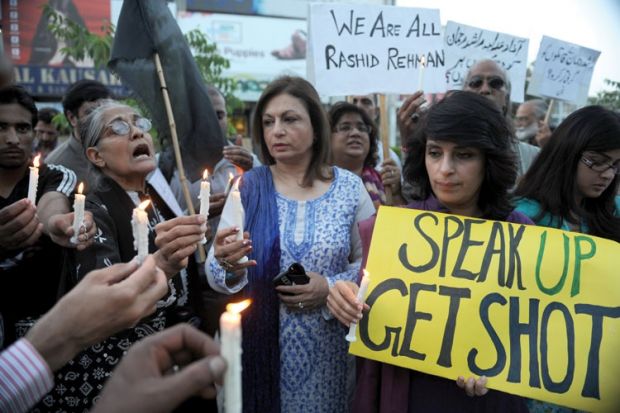Source: Getty
Standing up: Pakistanis protest against the killing of lawyer Rashid Rehman
The recent assassination of the lawyer and human rights activist Rashid Rehman – who claimed that he had received repeated death threats after agreeing to defend Junaid Hafeez, an adjunct lecturer at the Bahauddin Zakariya University, against charges of blasphemy – has raised wider concerns about academic freedom in Pakistan.
In response to the killing in Multan on 7 May, the Scholars at Risk Network in New York issued a statement. It notes that “Rehman had taken up the case in 2013 when previous defense counsel withdrew after similar threats” and it then goes on to highlight the concerns raised by the assassination.
“In addition to the deprivation of the right to life of the victim and harms to the others injured, their families and associates, an attack on defense counsel deprives defendants of due process and a fair trial,” the network says.
“Where the defendant is a scholar detained for nonviolent expressive activity, as in this case, an attack on defense counsel also undermines academic freedom by denying the scholar a full and fair defense and sending a message of intimidation throughout the university community and society.”
In the Education under Attack, 2014 report by the Global Coalition to Protect Education from Attack (of which the Scholars at Risk Network is a member), Pakistan is cited as one of the six most “heavily affected” countries for violence against schools and universities. Hundreds of attacks were documented between 2009 and 2012, and one student and four academics were killed.
Clare Robinson, Scholars at Risk’s director of protection services, noted that the network had logged three other attacks on higher education since November: a Shia imam and professor at Hashmat Ali College killed by unidentified gunmen; a professor at the University of Gujrat, said to have been “progressive-minded” as well as a Shia, shot dead with his driver on the way to work; and a first-year student at Khyber Medical College allegedly harassed and assaulted by an academic because she wore a face veil.
To put this in a wider context, Ms Robinson added that “SAR has been contacted by over 65 applicants reporting threats in Pakistan”. Mr Rehman was “representing someone who was a lecturer and a student and working in the field of gender studies – all of which raise questions about wider threats to academic freedom in Pakistan”.
She said that Scholars at Risk feared that Mr Hafeez “will never get the representation he needs for a fair trial. His other lawyers were threatened and asked to step down, which they did. No one has been held accountable for those threats, nor, to the best of my knowledge, for the threats issued to Mr Rehman. Such threats also need to be taken seriously.”
Campaigners argue that Pakistan’s strict laws against blasphemy, which theoretically carry the death penalty, are often used to settle personal scores or deployed by right-wingers keen to silence liberals.
“We have seen a handful of recent cases regarding blasphemy,” agreed Ms Robinson, “which risk eroding the rule of law.”
Register to continue
Why register?
- Registration is free and only takes a moment
- Once registered, you can read 3 articles a month
- Sign up for our newsletter
Subscribe
Or subscribe for unlimited access to:
- Unlimited access to news, views, insights & reviews
- Digital editions
- Digital access to THE’s university and college rankings analysis
Already registered or a current subscriber? Login





